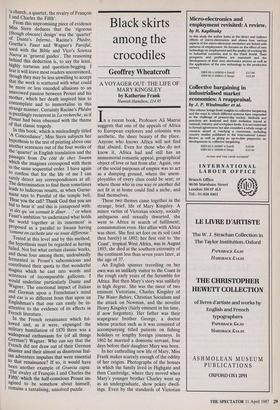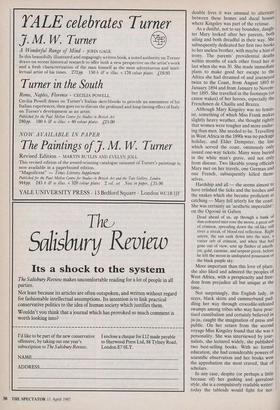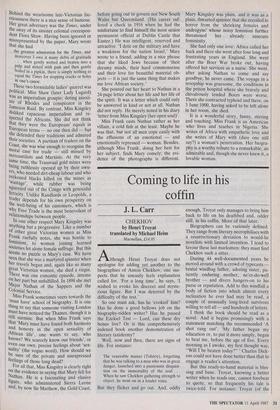Black skirts
among the crocodiles
Geoffrey Wheatcroft
A VOYAGER OUT: THE LIFE OF MARY KINGSLEY by Katherine Frank
Hamish Hamilton, £14.95
In a recent book, Professor Ali Mazrui suggests that one of the appeals of Africa to European explorers and colonists was aesthetic, the sheer beauty of the place. Anyone who knows Africa will not find that absurd. Even for those who do not know it, Africa had and still has an immemorial romantic appeal, geographical object of love or lust from afar. Again, one of the social purposes of empire was to act as a dumping ground, where the unem- ployables of every class could be sent; or where those who in one way or another did not fit in at home could find a niche, and find themselves.
These two themes came together in the strange, brief, life of Mary Kingsley. A minor victim of Victorian society, socially ambiguous and sexually thwarted, she went to Africa in search of fulfilment; consummation even. Her affair with Africa was short. She first set foot on its soil (and then barely) in 1892; her first visit to 'the Coast', tropical West Africa, was in August 1893; she died at the southern extremity of the continent less than seven years later, at the age of 37.
An English spinster travelling on her own was an unlikely visitor to the Coast in the rough early years of the Scramble for Africa. But then Mary's story was unlikely in high degree. She was the niece of two eminent Victorians, Charles Kingsley of The Water Babies, Christian Socialism and the attack on Newman, and the novelist Henry Kingsley (fairly eminent in his time, if now forgotten). Her father was their scapegrace brother George, a doctor whose practice such as it was consisted of accompanying titled patients on fishing holidays or lengthy foreign journeys. In 1862 he married a domestic servant, four days before their daughter Mary was born.
In her enthralling new life of Mary, Miss Frank makes scarcely enough of the oddity of her origins. Photographs of the houses in which the family lived in Highgate and then Cambridge, where they moved when Mary's younger brother Charley went up as an undergraduate, show pokey dwell- ings. Even by the standards of Victorian double lives it was unusual to alternate between these homes and ducal houses where Kingsley was part of the retinue. As a dutiful, not to say bounden, daugh- ter Mary looked after her parents, both ailing and both dreadful in their way. She subsequently dedicated her first two books to her useless brother, with maybe a hint of irony. The parents' providential deaths within months of each other freed her at last when she was 30. She made immediate plans to make good her escape to the Africa she had dreamed of and journeyed twice to the Coast, from August 1893 to January 1894 and from January to Novem- ber 1895. She travelled in the footsteps (or canoe wakes) of her heroes, especially the Frenchmen de Chaillu and Brazza.
Although Mary Kingsley was no femin- ist, something of which Miss Frank makes slightly heavy weather, she thought rightly that women were tougher and more endur- ing than men. She needed to be. Travelling in West Africa in the 1890s was no package holiday, and Elder Dempster, the line which served the coast, ominously only issued one-way tickets. Many were buried in the white man's grave, and not only from disease. Two likeable young officials Mary met on her travels, one German and one French, subsequently killed them- selves.
Hardship and all — she seems almost to have relished the ticks and the leeches and the snakes which she became proficient at catching — Mary fell utterly for the coast. She was certainly an 'aesthetic imperialist': on the Ogooue in Gabon Dead ahead of us, up through a bank of dun-coloured mist rose the moon, a great orb of crimson, spreading down the oil-like still river a streak of blood-red reflection. Right astern, the sun sank down into the mist, a vaster orb of crimson, and when that had gone out of view, sent up flashes of ameth- yst, gold, carmine, and serpent green, before he left the moon in undisputed possession of the black purple sky.
More important than this love of place, she also liked and admired the peoples of West Africa, with a perspicacity and free- dom from prejudice all but unique at the time.
Not surprisingly, this English lady, in stays, black skirts and cummerbund pad- dling her way through crocodile-infested swamps among tribes who may have prac- tised cannibalism and certainly believed in ju-ju, caught the imagination of press and public. On her return from the second voyage Miss Kingsley found that she was a personality. She was interviewed by jour- nalists, she lectured widely, she published two best-selling books. With no formal education, she had considerable powers of scientific observation and her books won the approbation she most craved, that of scholars.
In any case, despite (or perhaps a little because of) her gushing and garrulous style, she is a compulsively readable writer: today the tabloids would fight for per. Behind the wearisome late-Victorian fac- etiousness there is a nice sense of humour. Her great adversary was the Times, under the sway of its sinister colonial correspon- dent Flora Shaw. Having been ignored or misrepresented by the paper, Mary wrote that she had the greatest admiration for the Times, and
moreover I owe it many debts of gratitude • . . when gently wetted and beaten into a
pulp and mixed with gum and then gently boiled in a pipkin, there is simply nothing to equal the Times for stopping cracks or holes in one's canoe.
These two formidable ladies' quarrel was Political. Miss Shaw (later Lady Lugard) was an imperialism groupie: doting associ- ate of Rhodes and conspirator in the Jameson Raid. By contrast, Miss Kingsley disliked rapacious imperialism and re- spected the Africans. She did not think that they were the Europeans' equals in European terms — no one then did — but She defended their traditions and admired their societies. A partisan of traders on the Coast, she was wise enough to recognise the moral case for trade — still missed by mercantilists and Marxists. At the very same time, the Transvaal gold mines were bemg ruthlessly opened up by their own- ers, who needed dirt-cheap labour and who reckoned blacks killed on the mines as wastage', while rubber was being squeezed out of the Congo with genocidal ferocity. Unlike Randlords or Leopolds, a trader depends for his own prosperity on the well-being of his customers, which is Why Free Trade is the most benevolent of relationships between people. In one other respect Mary Kingsley was anything but a progressive. Like a number of other great Victorian women as Miss Frank ruefully notes, she was hostile to feminism, to women joining learned societies let alone female suffrage. But this seems no puzzle in Mary's case. We have seen that she was a martyred spinster when her travels began and, again like so many great Victorian women, she died a virgin. There was one romantic episode, intense on her part but unfulfilled. In 1898 she met Major Nathan of the Sappers and the Colonial Service.
Miss Frank sometimes veers towards the must have' school of biography. It is one thing to say that someone visiting London must have noticed the Thames, though it is still surmise. But when Miss Frank says that 'Mary must have found both harmony and honesty in the open sexuality of African life', one wants to say, who knows? We scarcely know our friends', or even our own, precise feelings about 'sex- uality' (the vogue word). How should we be sure of the private and unexpressed feelings of those long dead? For all that, Miss Kingsley is clearly right on the evidence in saying that Mary fell for Nathan. He is a fascinating and elusive figure, who administered Sierra Leone and, by now Sir Matthew, the Gold Coast, before going out to govern not New South Wales but Queensland. (His career suf- fered a check in 1916 when he had the misfortune to find himself the most senior permanent official at Dublin Castle that Easter.) He was intelligent, reserved and attractive. 'I dote on the military and have a weakness for the nation Israel,' Mary wrote to a friend, adding in a nice phrase that she liked Jews because of 'their dreamy minds, their hard commonsense and their love for beautiful material ob- jects — it is just the same thing that makes me love African society.'
She poured out her heart to Nathan in a 24-page letter about her life and her life of the spirit. It was a letter which could only be answered in kind or not at all. Nathan did not reply. He merely noted in his diary 'letter from Miss Kingsley (her open soul)'.
Miss Frank casts Nathan rather as her villain, a cold fish at the least. Maybe he was that, but not all men cope easily with the effusions of an emotional — and emotionally repressed — woman. Besides, although Miss Frank, doing her best for her subject, finds Mary comely; the evi- dence of the photographs is different. Mary Kingsley was plain, and it was as a plain, thwarted spinster that she recoiled in horror from the 'shrieking females and androgyns' whose noisy feminism further threatened her already insecure femininity.
She had only one love: Africa called her back and there she went after four long and frustrating years in England. She went after the Boer War broke out, having offered her services as a nurse. She went, after asking Nathan to come and say goodbye; he never came. The voyage in a troopship was gruesome, the conditions in the prison hospital where she bravely and chivalrously tended Boers were worse. There she contracted typhoid and there, on 3 June 1900, having asked to be left alone in her room, she died.
It is a wonderful story, funny, stirring and touching. Miss Frank is an American who lives and teaches in Nigeria. She writes of Africa with empathetic love and she writes of Mary with (dare one still say?) a woman's penetration. Her biogra- phy is a worthy tribute to a remarkable, an admirable and, though she never knew it, a lovable woman.


























































 Previous page
Previous page